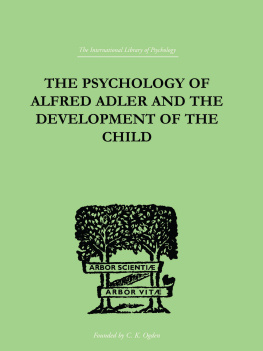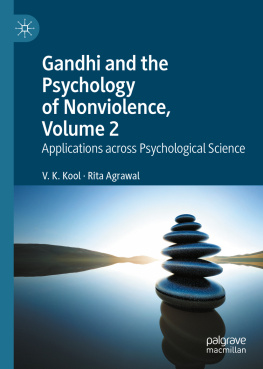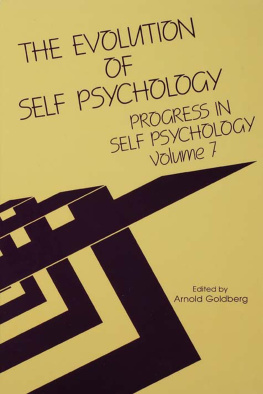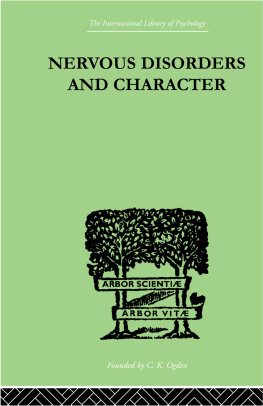
The International Library of Psychology
The Psychology of Alfred Adler and the Development of the Child

The International Library of Psychology
INDIVIDUAL DIFFERENCES
In 21 Volumes
I | The Practice and Theory of Individual |
Psychology | Adler |
II | The Neurotic Constitution | Adler |
III | Duality | Bradley |
IV | Problems of Personality | Campbell et al |
V | An Introduction to Individual Psychology | Dreikurs |
VI | The Psychology of Alfred Adler and the |
Development of the Child | Ganz |
VII | Personality | Gordon |
VIII | The Art of Interrogation | Hamilton |
IX | Appraising Personality | Harrower |
X | Physique and Character | Kretschmer |
XI | The Psychology of Men of Genius | Kretschmer |
XII | Handreading | Laffan |
XIII | On Shame and the Search for Identity | Lynd |
XIV | A B C of Adlers Psychology | Mairet |
XV | Alfred Adler: Problems of Neurosis | Mairet |
XVI | Principles of Experimental Psychology | Piron |
XVII | The Psychology of Character | Roback |
XVIII | The Hands of Children | Spier |
XIX | The Nature of Intelligence | Thur stone |
XX | Alfred Adler: The Pattern of Life | Wolfe |
XXI | The Psychology of Intelligence and Will | Wyatt |
THE PSYCHOLOGY OF ALFRED ADLER AND THE DEVELOPMENT OF THE CHILD
MADELAINE GANZ
Introduction by Pierre Bovet

First published in 1953 by
Routledge and Kegan Paul Ltd
Reprinted 1999, 2000, 2001 by
Routledge
2 Park Square, Milton Park, Abingdon, Oxon, OX14 4RN
Transferred to Digital Printing 2006
Routledge is an imprint of the Taylor & Francis Group
1953 Madelaine Ganz, Translated by Philip Mairet
All rights reserved. No part of this book may be reprinted or reproduced or utilized in any form or by any electronic, mechanical, or other means, now known or hereafter invented, including photocopying and recording, or in any information storage or retrieval system, without permission in writing from the publishers.
The publishers have made every effort to contact authors/copyright holders of the works reprinted in theInternational Behavioural and Social Sciences Library. This has not been possible in every case, however, and we would welcome correspondence from those individuals/companies we have been unable to trace.
These reprints are taken from original copies of each book. In many cases the condition of these originals is not perfect. The publisher has gone to great lengths to ensure the quality of these reprints, but wishes to point out that certain characteristics of the original copies will, of necessity, be apparent in reprints thereof.
British Library Cataloguing in Publication Data
A CIP catalogue record for this book is available from the British Library
The Psychology of Alfred Adler and the Development of the Child
ISBN 978-0415-21056-0
Individual Differences: 21 Volumes
ISBN 0415-21130-1
The International Library of Psychology: 204 Volumes
ISBN 0415-19132-7
Printed and bound by CPI Antony Rowe, Eastbourne
ISBN 9781136331497
DOI: 10.4324/9781315010175
It matters little what we bring into the world, everything depends on what we make of it.
A. Adler
Preface
MADEMOISELLE MADELAINE GANZ asks me for a preface to a book which, after being awarded the Lucien Cellrier prize by the University of Geneva, has gained for her the degree of Doctor of Philosophy. I have no qualification for introducing the work beyond having been its instigator and first reader. Having no personal knowledge of the institutions to which she has devoted her study, I will limit myself to saying why I am happy to welcome it into ourCollection d'Actualits Pda-gogiques and to place this monograph beside those which have so far attained that distinction.
Mlle. Ganz's intelligent and attentive description of the Adlerian schools and consultative methods comes as a timely addition to the accounts which Mr. Anderson and Mme. Loosli have given us of the Healy psychological clinic, and of the medico-psychological consultations at the Institut J. J. Rousseau. Far from rendering each other redundant, these monographs will arouse in their readers a desire for information about other social services of the same kind. Why should we not also be told of the procedure at Leipzig and at Paris, at Guy's Hospital in London and at the observational station at Moll? Is it not encouraging to see that this work is proceeding on every hand, and singularly instructive to compare the methods employed?
H. H. Anderson, The Psychological Clinics for Children in the United States and the Work of Dr. Healy. 1929. Marguerite Loosli-Usteri, Les enfants difficiles et leur milieu familiaie. L activit dune consultation medico-pedagogique. 1935.
What at first sight chiefly distinguishes psychological-pedagogical consultations from one another is the positionthat they accord respectively to methods of gaining information; interrogation, clinical examination, experimentation or, to name only the two most controversial procedures, tests on the one hand, and, on the other, investigation into the subconscious. We have seen in Healy's work the considerable place assigned to tests of the most varied kinds; Mme. Loosli, who has acquired eminent competence in the application of the Rorschach test to children, has shown us how serviceable she has found this method, of a psychoanalytic tendency, in conjunction with others that seek to measure the aptitudes and the level of intelligence. With Adler, it is the interpretation of behaviour, as a function of desires for the most part unconscious, to which the greatest importance is attached.
May I state, briefly, from my personal experience, the present position in relation to concrete cases of this recourse to the psychology of deeper levelsto what the Germans call Depth-psychology. It was a great satisfaction to me, at the Congress of the New Education held in South Africa in 1934, to see my experience exactly confirmed by the far wider experience of Boyd from Glasgow.
People send us children whose school records are wholly deplorable: their orthography, arithmetic, their German or Latin, or what you willare so poor that we are asked whether some exercises in concentration, some kind of orthophrenic gymnastics are not indicated. We begin by simply measuring the intellectual capacity of the child according to the classic scale of Binet (and I do not yet understand how informed practitioners, those of Vienna for example, can voluntarily deprive themselves of such information as this affords). Frequently we find that the child's mental level is perfectly normal, that its intelligence quotient exceeds 100: one cannot ascribe its want of success at school to mental backwardness. The intelligence is notin question. Can it be, then, an emotional disequilibrium that is troubling the child's attention to study? The Rorschach test is of service in distinguishing any such instability. Other instruments of research are employed elsewhere. Boyd makes use, with great success, of a list of associations inspired by Jung. We can also tell whether it will be prudent to confide the further interrogation of the child to a psychiatrist, or whether the instability thus betrayed is such as an examination of the child's family and social surroundings can clarify, by placing ourselves at one or another of the points of view recommended by the diverse schools of psychoanalysis.
Next page









